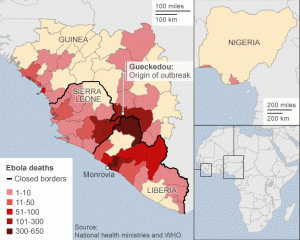Security issues are generally thought of as conflict. They are associated with armed fighting, military intervention and civilian deaths. The Ebola crisis definitely does not fit into this category. Yet the UN security council on Thursday declared the Ebola outbreak “a threat to international peace and security”.
According to the World Health Organisation’s latest figures, this is the deadliest Ebola epidemic on record having infected more than 6,200 people in West Africa, killing nearly half of them. The US Centres for Disease Control has estimated that the number of cases in Liberia and Sierra Leone, in a worst-case scenario, could rise to 1.4 million by January. The virus is spread through bodily fluids and once symptoms become apparent can kill within four to five days. Symptoms include rampant fever, severe muscle pain, vomiting, diarrhoea and, in some cases, internal and external bleeding through the eyes and mouth.
The UN Security Council declared the Ebola outbreak a “threat to international peace and security“. To provide context, this declaration was made in the same meeting of the UN Security Council as that which discussed ISIS and unanimously passed a resolution compelling member states to ban their citizens from supporting the Islamic State group. This is only the second ever public health emergence to be addressed by the Security Council. Ebola, like ISIS, has bypassed attempts by governments to control it.
This highlights the broad nature of a security crisis and the wide ranging methods that can be used to deal with one. Though the most common form of crisis may be armed conflict, there a broader range of characteristics that should be considered. A crisis is merely an event that does, or is expected to, cause unstable and dangerous conditions. The Ebola crisis does such. The number of cases is currently doubling every three weeks making it highly unstable. Given how easily it is currently spreading and the unpredictable nature at which it is doing so, it is also highly dangerous. The government of Sierra Leone has implemented travel bans across the country and has ordered more than one million people into quarantine, yet the disease is still spreading and many of those not affected are starving given the hast with which many of the movement bans were implemented.
It could be classed as a humanitarian crisis given it is threatening the health of a large group of people. However it can also be classed a security crisis as given rate at which the disease has spread and the induced vulnerability of surrounding countries, as well as the threat countries on a global scale, that this creates. This is highlighted in Obama’s speak to the UN general assembly, where he grouped Ebola with the crisis in Ukraine and the threat posed by Islamic State in Iraq and Syria as new dangers to global security.
Ultimately it does not matter what kind of crisis the Ebola outbreak is classes as, as long as it is called a crisis. The UN using that one word is enough to mobilise countries around the world, broadening their efforts to stop the crisis. European nations have pledged millions of dollar to the effort as well as health aid workers, similarly the USA has also pledged troops to help the effort.
Will this be enough to curb the rate of spread and save the lives of thousands of people? Only time will tell. But the UN’s efforts are a big step towards achieving such a goal.
